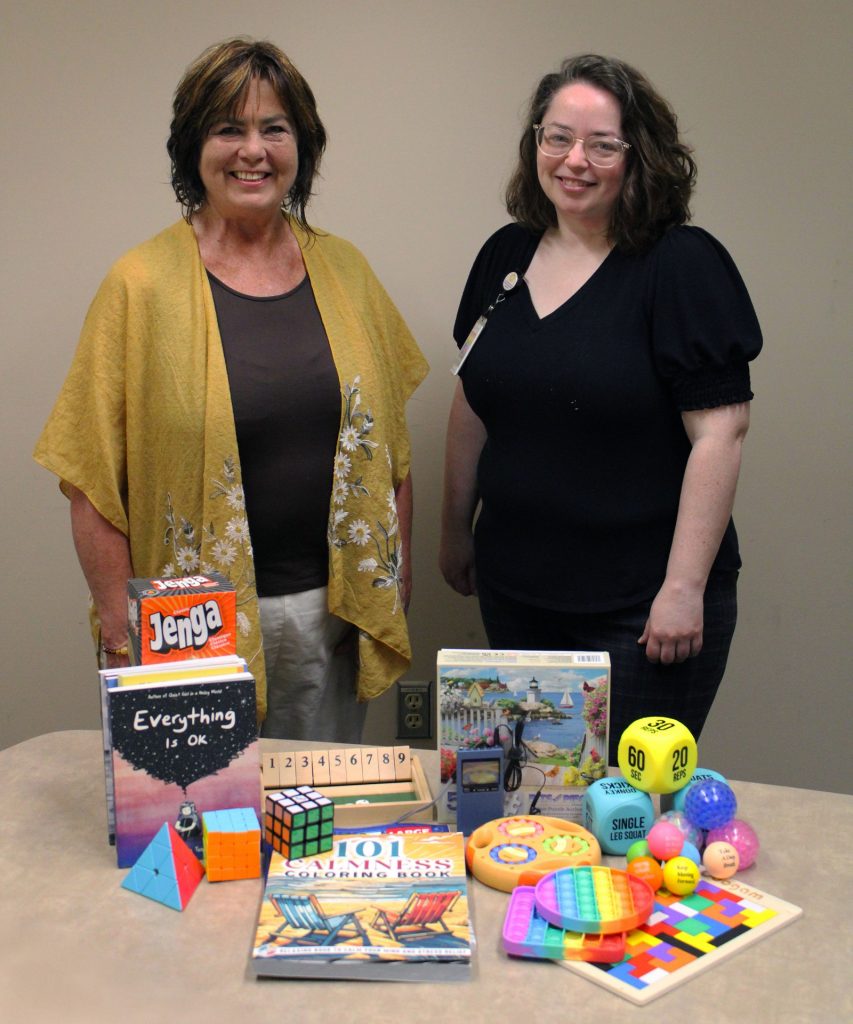Family CARE Grant Provides Mental Health Care Tools – and Human Connection – for PICU Patients
by Graham Strong
 Pictured (L-R) Donna Ross, Theraputic Recreationist, Adult Mental Health and Dr. Kristine Knauff, Psycologist, Adult Mental Health with some of the new sensory tools purchased through the Family CARE Grant.
Pictured (L-R) Donna Ross, Theraputic Recreationist, Adult Mental Health and Dr. Kristine Knauff, Psycologist, Adult Mental Health with some of the new sensory tools purchased through the Family CARE Grant.We’ve all felt stress in our lives. Maybe we’ll comfort ourselves with a Camomile tea or get a hug from a loved one. But for people experiencing an acute mental health event, those feelings can be overwhelming to the point of hospitalization. To make matters worse, the very things that might bring comfort can become unsafe for themselves or others.
But thanks to a great idea and your donations to the Thunder Bay Regional Health Sciences Foundation Family CARE Grant program, you’re helping bring comfort and mindfulness to people when they need it most.
“Opportunities for mindfulness are important for relaxation,” said Donna Ross, a therapeutic recreationist in Adult Mental Health Services’ Psychiatric Intensive Care Unit (PICU) at the Thunder Bay Regional Health Sciences Centre. “For example, if you’re playing with a fidget toy, your mind is focused on that, not what’s happening in the outside world.”
Ross along with Dr. Kristine Knauff, who is a psychologist with Adult Mental Health, and others within the unit put together a list of items that could safely bring comfort and distraction to patients.
“Sensory tools help people get those restless feelings out in a way that’s safe,” Knauff said. “Distraction can also help alleviate the stress that comes with those feelings.”
Thanks to a Family CARE Grant, the team purchased several materials including a mini-library of books, fidget toys such as stress balls and fidget spinners, jigsaw and mind puzzles including Rubik’s cubes, stuffed animals, playing cards, and wireless radios for music. All items were added to the list in consultation with staff and patients, and were vetted to ensure safety.
The items represent a wide range of sensory tools including tactile, mental, and aural (listening) stimulation. Not only does this long list help ensure the unit will have the right object for the person, the element of choice can be therapeutic and empowering in itself.
“Giving choices is always very important,” Ross said.
“Providing a variety of choices also helps people remember the things that have helped them in the past,” Knauff added. “We’re more likely to have something that’s familiar to them and therefore comforting, rather than trying to introduce new ideas to people who are already experiencing intense stress and emotions.”
This patient-centred approach to psychiatric care follows the Safewards model of care designed for acute mental health inpatient settings. Safewards promotes interventions that help calm patients through positive actions including through the use of sensory tools. The goal is to provide immediate help to patients in crisis by meeting them at their level, calming them in a safe space, and providing them with stimulation to keep their minds active and off the stressors that triggered the crisis.
“Sometimes the simple act of offering them an item makes them feel cared for,” Ross said. “That human connection – reaching out to a person in need – can be huge.”
Funding for sensory items is one of the many ways your donations to the Family CARE Grant program supports patients at our Hospital. Every day, you help fund less expensive projects suggested by staff that can make a huge difference to patients and family members. To find out how you can donate to the Family CARE Grant program or to read about other great projects like this, please visit: healthsciencesfoundation.ca/familycare